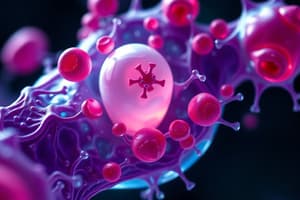Podcast
Questions and Answers
What is the nucleus responsible for in a cell?
What is the nucleus responsible for in a cell?
- Generating energy via respiration
- Synthesizing proteins and lipids
- Performing photosynthesis
- Housing DNA (correct)
Which organelle is primarily involved in protein and lipid synthesis?
Which organelle is primarily involved in protein and lipid synthesis?
- Mitochondria
- Chloroplasts
- Nucleus
- Endoplasmic reticulum (correct)
What is the standard order in which scientists present research findings?
What is the standard order in which scientists present research findings?
- Results, Introduction, Materials and Methods, Discussion
- Materials and Methods, Introduction, Discussion, Results
- Discussion, Results, Materials and Methods, Introduction
- Introduction, Materials and Methods, Results, Discussion (correct)
Which of the following is NOT a life process in living systems?
Which of the following is NOT a life process in living systems?
Which cell organelle is primarily responsible for generating energy via respiration?
Which cell organelle is primarily responsible for generating energy via respiration?
What do scientists typically avoid during the 'Results' section of a research paper?
What do scientists typically avoid during the 'Results' section of a research paper?
What key principle in cell biology concerns the balance between internal and external environments?
What key principle in cell biology concerns the balance between internal and external environments?
Which factor governing homeostasis involves the movement of water across a semi-permeable membrane?
Which factor governing homeostasis involves the movement of water across a semi-permeable membrane?
What type of equilibrium reflects a system's capacity to maintain self-organization despite perturbations?
What type of equilibrium reflects a system's capacity to maintain self-organization despite perturbations?
Which theoretical biologist introduced the concept of homeodynamic ranges in cell biology?
Which theoretical biologist introduced the concept of homeodynamic ranges in cell biology?
What do cells use to communicate with neighboring cells, establishing relationships that constitute tissues and organs?
What do cells use to communicate with neighboring cells, establishing relationships that constitute tissues and organs?
How does the concept of homeostasis influence growth, development, repair, and response to environmental stimuli in cells?
How does the concept of homeostasis influence growth, development, repair, and response to environmental stimuli in cells?
Flashcards
Cell Biology
Cell Biology
The study of cell structure, function, and interactions in living organisms.
Life Processes
Life Processes
Essential activities that enable survival, reproduction, and adaptation in living organisms.
Organelles
Organelles
Specialized structures within cells that perform distinct functions.
Nucleus
Nucleus
Signup and view all the flashcards
Mitochondria
Mitochondria
Signup and view all the flashcards
Chloroplasts
Chloroplasts
Signup and view all the flashcards
Endoplasmic Reticulum
Endoplasmic Reticulum
Signup and view all the flashcards
Homeostasis
Homeostasis
Signup and view all the flashcards
Osmosis
Osmosis
Signup and view all the flashcards
Homeodynamic Ranges
Homeodynamic Ranges
Signup and view all the flashcards
Cell Communication
Cell Communication
Signup and view all the flashcards
Research Process
Research Process
Signup and view all the flashcards
Study Notes
Exploring Life Processes through Cell Biology
Cell biology, a foundational cornerstone of modern biology, focuses on understanding the structures, functions, and interactions within living cells—the fundamental units responsible for life processes across diverse organisms. Simultaneously, life processes refer to the essential series of events that enable survival, reproduction, adaptation, and energy conversion in living systems. Let's delve deeper into these two fields, drawing insight from both current research standards and best practices for academic writing.
When studying cells, scientists typically follow a standard research process involving:
- Introduction: States the motivation behind the investigation and the significance of the research question(s).
- Materials and Methods: Describes how the experiments were performed, ensuring clarity to facilitate repeated testing of the observations.
- Results: Presents observed outcomes as evidence, avoiding premature interpretation.
- Discussion: Interprets the results in relation to previous knowledge, offering insights, and addressing potential limitations.
Understanding cellular dynamics requires grasping various specialized components known as organelles. For instance, the nucleus houses DNA, mitochondria generates energy via respiration, chloroplasts perform photosynthesis, and the endoplasmic reticulum synthesizes proteins and lipids. Organelle function directly impacts the overall organization, homeostasis, and vitality of cells, thereby influencing life processes.
One key principle in cell biology concerns the balance maintained between internal and external environments, termed "homeostasis." Meeting the physiochemical conditions necessary for optimal functioning drives growth, development, repair, and response to environmental stimuli. Factors governing homeostasis include osmosis, diffusion, active transport, and secretion.
Furthermore, cells continuously interact with neighboring cells and communicate using signaling molecules, establishing a symphony of relationships that collectively constitute tissues, organs, and whole organisms. Such communication networks facilitate coordinated activities essential for maintaining health and responding to stressors.
The concept of homeodynamic ranges, introduced by theoretical biologist Stuart Kauffman, provides a theoretical framework underpinning life processes and evolution. According to his model, living entities exist on the edge of chaos, balancing stability and flexibility to adapt to changing circumstances. This dynamic equilibrium reflects a system's capacity to maintain ongoing self-organization despite perturbations, serving as a plausible explanation for resilience and regenerative capabilities exhibited by living beings.
Ultimately, exploring life processes through cell biology underscores the shared structural similarities and functional principles among diverse forms of life, deepening our appreciation and comprehension of the natural world around us.
Studying That Suits You
Use AI to generate personalized quizzes and flashcards to suit your learning preferences.
Description
Delve into the foundational concepts of cell biology and life processes, exploring the structures, functions, and interactions within cells, as well as the essential events that sustain life in organisms. Learn about organelles, homeostasis, communication networks, and the theoretical framework of homeodynamic ranges in understanding the dynamics of living systems.




